B O O K S
(Highlights of selected books written by Louis Pojman)
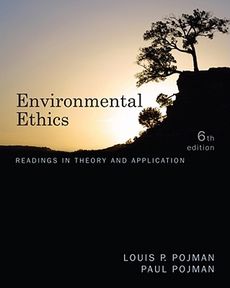
1. Environmental Ethics: Readings in Theory and Application 6th edition 2012
Paul Pojman, Co-Editor [1966 – 2012]
The most comprehensive introduction to environmental ethics available, this book offers students a current look at the issues and topics that dominate the field today, seamlessly moving from theory to application. This edition of the Pojmans' popular anthology, like its predecessors, includes numerous topic areas not covered in other anthologies and feature articles are carefully selected for clarity and accessibility. The text follows a dialogic pro-con format presenting divergent positions on each topic, ensuring that students are both exposed to and understand both sides of every topic, so they can develop their own informed positions. New selections cover Food Ethics and Climate Change and Energy Policy. http://www.cengage.com/asiahed/productlist.do
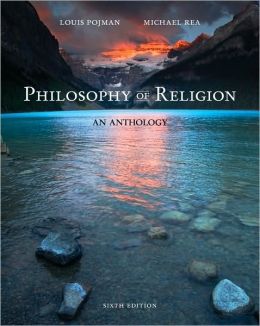
2. Philosophy of Religion: An Anthology 6th edition 2012
Michael Rea, co-editor
The most comprehensive text in its field, this anthology includes 74 articles in 9 areas of philosophy of religion: The Concept of God; Traditional Arguments for the Existence of God; Religious Experience; The Problem of Evil; Miracles, Death and Immortality; Faith and Reason; Science, Religion, and Evolution; and Religious Pluralism. The arrangement of the articles and the introductions which accompany them help place the readings in their historical or contemporary context, and ensure that the reader encounters a spectrum of viewpoints. http://www.cengagebrain.com/shop/en/US/storefront/US
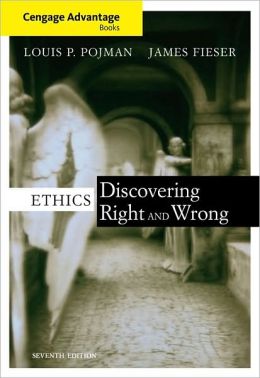 3. Ethics: Discovering Right and Wrong 7th edition 2012 3. Ethics: Discovering Right and Wrong 7th edition 2012
James Fieser, co-editor
A concise yet comprehensive overview of the fundamental objectives and outlooks of Ethical Theory, this book challenges students of all ages to develop their own moral theories and to reason through ethical problems for themselves. The text even-handedly raises critical questions and fosters independent thinking within a rigorous presentation that draws numerous examples from both classical and contemporary sources. Chapters address topics such as personal and religious ethics, the most recent developments in moral theory, and feminist and multicultural ethical perspectives. Study questions and useful bibliographies further assist students delving deeper into philosophy.
http://www.cengage.com/aushed/instructor.do?disciplinenumber=1069&product_isbn=9781111298173
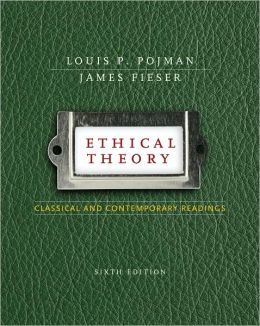
4. Ethical Theory: Classical and Contemporary Readings 6th edition 2012
James Fieser, co-editor
This authoritative and reader-friendly anthology will help you think through some of humanity's most persistent questions regarding right and wrong, good and bad. The book cuts through the confusion and delivers a clear and comprehensive selection of readings from classical and contemporary sources. Presented in a dynamic pro and con format, with detailed summaries of each argument, this comprehensive anthology allows you to watch the ethical debate unfold before your eyes.
http://www.cengage.com/search/productOverview.do?Ntt=pojman||9780495808770&N=16&Ntk
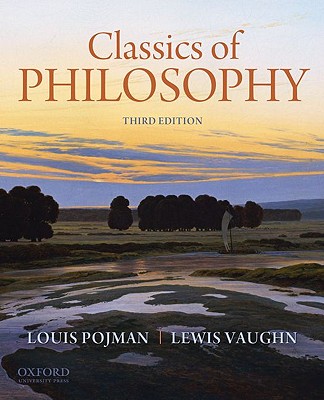
5. Philosophy: The Classics 3rd edition 2010 Lewis Vaugn, co-editor
Pedagogical features new to this edition include review questions after each chapter, and illustrative portraits of several philosophers in the text. A Companion Website for both students and instructors contains online summaries, test questions, PowerPoint slides, and essay questions for each author (for instructors); and online flashcards, quizzes, review questions, and web links for students.
http://www.oup.com/us/catalog/he/subject/Philosophy/IntroductiontoPhilosophyHistoric/?view=usa
 |
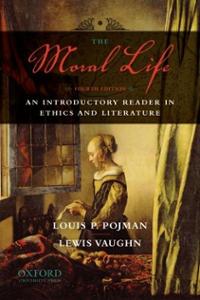 6. The Moral Life: An Introductory Reader in Ethics and Literature 4th edition 2010 6. The Moral Life: An Introductory Reader in Ethics and Literature 4th edition 2010
Lewis Vaughn, co-editor
The Moral Life brings together an extensive, varied collection of 85 classical and contemporary readings on ethical theory and practice, integrating literature with philosophy in an innovative way. It uses literary works to enliven and make concrete the ethical theory or applied issues addressed. Literary works by Angelou, Camus, Hawthorne, Huxley, Ibsen, Le Guin, Melville, Orwell, Styron, Tolstoy, and many others lead students into such philosophical concepts and issues as relativism; utilitarianism; virtue ethics; the meaning of life; freedom and autonomy; sex, love, and marriage; animal rights; and terrorism. These topics are developed further through readings by philosophers including Plato, Aristotle, Kant, Singer, Sartre, Nagel, and Thomson. This unique anthology emphasizes the personal dimension of ethics, which is often ignored or minimized in ethics texts. It also incorporates chapter introductions, study questions. http://www.oup.com/us/catalog/he/subject/Philosophy/Ethics/IntroductiontoEthic
 |
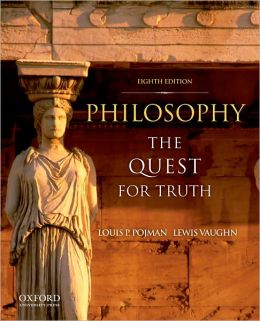
7. Philosophy: The Quest for Truth 8th edition 2010
Lewis Vaughn, co-editor
Praised for its accessibility and comprehensiveness, “Quest” provides an excellent selection of classical and contemporary readings on nineteen key problems in philosophy. Pojman has carefully organized the 76 essays in each section so that they present pro/con dialogues that allow students to compare and contrast the philosophers' positions. Topics covered include the nature of philosophy, the existence of God, immortality, knowledge, the mind-body question, personal identity, free will and determinism, ethics, political philosophy, and the meaning of life. http://www.oup.com/us/catalog/he/subject/Philosophy/IntroductiontoPhilosophyTopical

8. Terrorism, Human Rights, and The Case for World Government 2006
(Published Posthumously)
Pojman begins with a description of the growing menace of non-state terrorism to people everywhere and distinguishes "old-style" from "new-style" terrorism. He examines the virtues and vices of nationalism, and compares them to the promises and problems of cosmopolitanism. He ultimately argues that enforceable international law - which will promote peace and curtail terrorism - requires that we endorse a form of "soft nationalism," a form of nationalism ultimately compatible with a limited, republican form of world government. Then, he addresses universal human rights, arguing against the notion that they are an ethnocentric product of Western culture, and provides an overall justification of human rights as correlative to moral duties. He concludes on a hopeful note, proposing a world government as an effective countermeasure, albeit ambitious and controversial, to terrorism and its causes. https://rowman.com/Action/Search/RLPG/Pojman,%20Terrorism,%20Human%20Rights
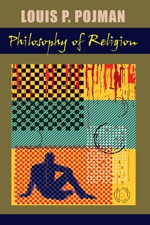
9. Philosophy of Religion [Re-issued by Waveland Press] 2009
Covering the major issues of the field succinctly and lucidly, this book includes original discussions of religious experience, the possibility that hope is an adequate substitute for belief, and the relationship between ethics and religion. Covering the major issues of the field succinctly and lucidly, iy takes an analytically rigorous approach, making it accessible in presentation. Pojman writes from an impartial perspective, presenting various options and points of view while guiding readers in their own search for truth through these often emotion-laden, crucial issues.
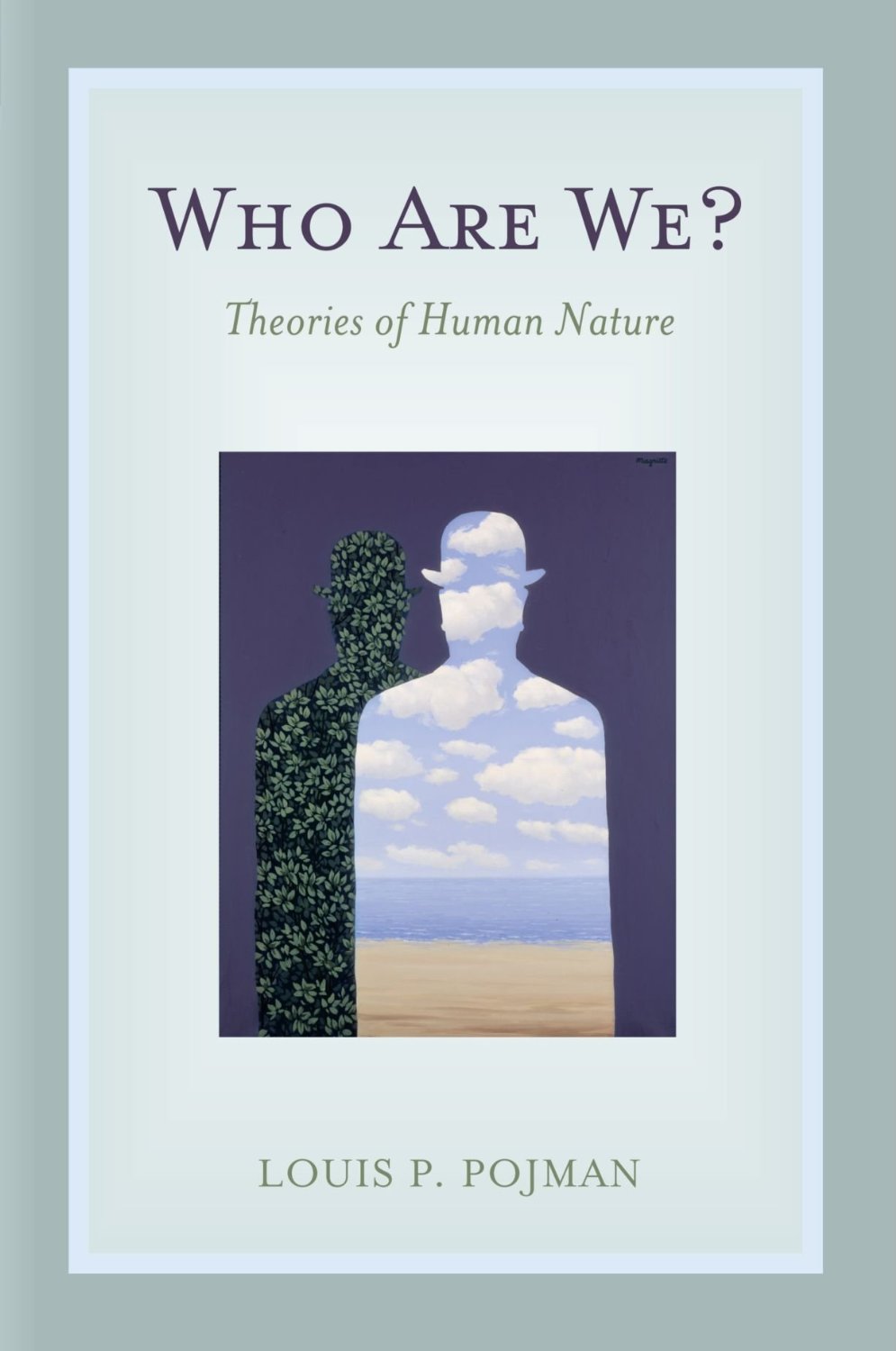 10. Who Are We? Theories of Human Nature 2005 10. Who Are We? Theories of Human Nature 2005
Since the dawn of human history, people have exhibited wildly contradictory qualities: good and evil, love and hate, strength and weakness, kindness and cruelty, aggressiveness and pacifism, generosity and greed, courage and cowardice. Experiencing a sense of eternity in our hearts—but at the same time confined to temporal and spatial constraints—we seek to understand ourselves, both individually and as a species. What is our nature? What is this enigma that we call human? Who are we? This book seeks to find answers to these questions by exploring major theories in Western philosophy and religion, along with several traditions in Eastern thought. The most comprehensive work of its kind, the volume opens with chapters on the Hebrew/Christian view of human nature and the contrasting classical Greek theories, outlining a dichotomy between faith and reason that loosely frames the rest of the book. Following chapters cover the medieval view, Hindu and Buddhist perspectives, conservative and liberal theories, Kant's Copernican revolution, Schopenhauer's transcendental idealism, and Karl Marx's theory. Freud's psychoanalytic view, the existentialist perspective, the Darwinian view, and scientific-materialism are also discussed. It concludes with a discussion of the question of free will, ultimately asserting that each one of us must decide for ourselves who and what we are and, based on our answer, how we shall live.
 |
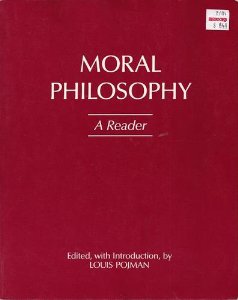 11. Moral Philosophy: A Reader 4th edition 2009 11. Moral Philosophy: A Reader 4th edition 2009
Peter Trammel, so-editor
A collection of 41 readings for a course on ethical theory, include both classical and contemporary expositions of perennial problems.
http://www.hackettpublishing.com/catalogsearch/result/?q=pojman
12. Titles formerly published by McGraw-Hill; Copy Right, now held by
Gertrude "Trudy" Pojman lpojman@aol.com
a. Global Environmental Ethics 2000
A 12 page summary of this book may be found as Chapter 73 of Environmental Ethics, listed as book number 2, above.
b. Global Political Philosophy 2003
c. Political Philosophy: Classic and Contemporary Readings 2002
d. Philosophy of Religion now published by Waveland Press (see above)
 |
ADDITIONAL BOOKS
1. The Logic of Subjectivity: A Critique of Kierkegaard's Philosophy of Religion, University of Alabama Press, 1984
2. Religious Belief and the Will, Routledge and Kegan Paul, 1986
3. Moral Philosophy: A Reader, revised 3rd edition, Hackett Publishing Company, 2003
4. The Abortion Controversy: A Reader, edited with Francis J. Beckwith, Jones and Bartlett,
revised 2nd edition, Wadsworth Publishing Co., 1998
5. Equality: A Reader, edited with Robert Westmoreland, Oxford University Press, 1996
6. Ethical Theory: Classical and Contemporary Readings, revised 5th edition,
Wadsworth Publishing Co., 2006
7. The Death Penalty: For and Against (Point-Counterpoint Series), joint-authored with Jeffrey Reiman, Rowman & Littlefield, Jan. 1998
8. Life and Death: Grappling with the Moral Dilemmas of Our Time, revised 2nd edition,
Wadsworth Publishing Co., 2000
9. Life and Death: A Reader, revised 2nd edition, Wadsworth Publishing Co., 2000
10. Desert: A Reader with Owen McLeod, Oxford University Press, 1998.
11. Kierkegaard’s Philosophy of Religion, International Scholars Press, 1999
12. Global Environmental Ethics, revised 2nd edition, McGraw-Hill, 2002
13. What Can We Know? An Introduction to the Theory of Knowledge, revised 2nd edition,
Wadsworth Publishing Co., 2000
14. Theory of Knowledge, revised 3rd edition, Wadsworth Publishing Co., 2003
15. Philosophy of Religion, Mayfield Publishing Co., 2000. (Transferred to McGraw-Hill, 2002)
16. Ethics: Discovering Right & Wrong, revised 5th edition, Wadsworth Publishing Co., 2006
17. Modern & Contemporary Political Philosophy, McGraw-Hill, 2001
18. Philosophy: The Quest for Truth, revised 6th edition, Oxford University Press, 2006
19. Philosophy of Religion: An Anthology, revised 4th edition, Wadsworth Publishing Co., 2003
20. Philosophy: The Pursuit of Wisdom, revised 5th edition, Wadsworth Publishing Co., 2006
21. Introduction to Philosophy: Classical and Contemporary Readings, 3rd edition, Oxford University Press, 2004
22. Justice: An Anthology, Prentice-Hall, 2006
23. Philosophy: The Traditions, 2nd edition, Wadsworth Publishing Co., 2005
24. Ethical Theory, revised 5th edition, Wadsworth Publishing Co., 2006
|








 3. Ethics: Discovering Right and Wrong 7th edition 2012
3. Ethics: Discovering Right and Wrong 7th edition 2012  6. The Moral Life: An Introductory Reader in Ethics and Literature 4th edition 2010
6. The Moral Life: An Introductory Reader in Ethics and Literature 4th edition 2010  10. Who Are We? Theories of Human Nature 2005
10. Who Are We? Theories of Human Nature 2005  11. Moral Philosophy: A Reader 4th edition 2009
11. Moral Philosophy: A Reader 4th edition 2009